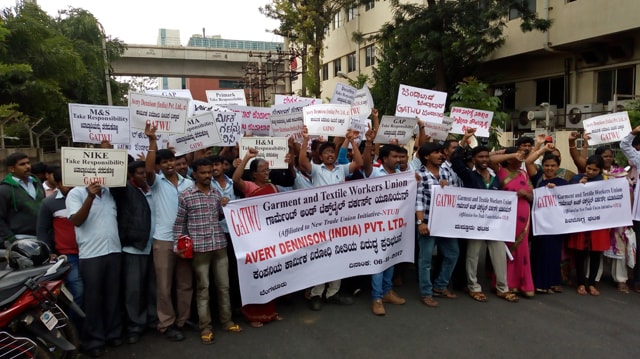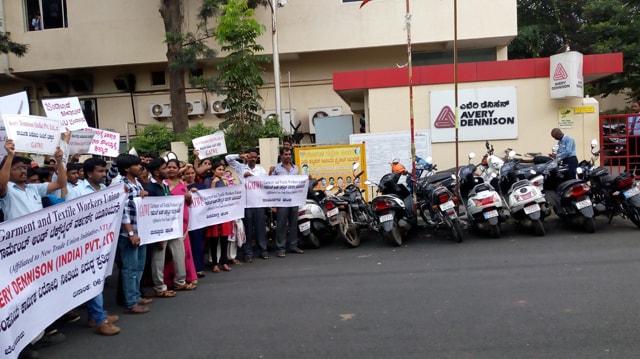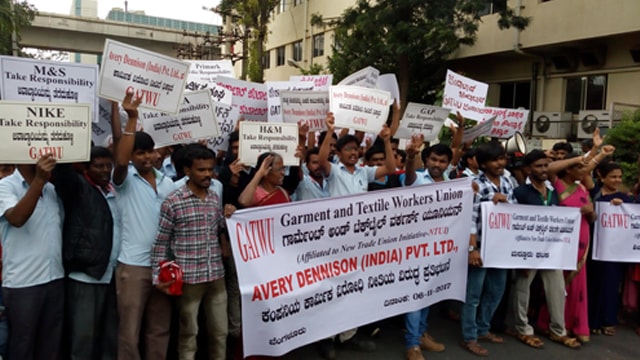
US-based Avery Dennison Retail Branding and Information Solutions (RBIS), a global leader in apparel and footwear branding, labelling and RFID solutions and IoT Smart Products Platform pioneer ‘Everything’, has been operating in India for almost two decades now. However, the company’s factory in Bengaluru has been grappling with a major labour turmoil, lately.
It all began in September 2017 when the company decided to lay-off 47 of its contract workers at its Bengaluru unit. Complaining of wrongful termination, the terminated workers approached the city’s Garment and Textile Workers Union (GATWU) for support and lodged their protest against the company. Besides staging a 9-day hunger strike and forming own union under the GATWU banner at Avery Dennison, they also knocked the door of the State Labour Department.
Stepping up their protest, the beleaguered workers have gone on to launch a social media campaign for worldwide support, including from International Union League for Brand Responsibility (IULBR). They have petitioned 130 global apparel brands for help as well.
No doubt, the dispute has brought some major attention to the ‘not-so-talked about’ link – contract workforce – in the apparel supply chain. Apparel Resources spoke to the spokespersons of both sides to unravel the finer details of the matter.
The laid-off contract workers have been working at Avery Dennison for 2-10 years, without break in service. The company had not only denied them the minimum wages but also “inhumanly” discriminated between them and permanent employees as regards wages, welfare, social security and safety and health aspects, GATWU Advisor Jayaram K.R apprised us.
There are a total of 270 contract workers at Avery Dennison, Bengaluru. Out of 270, roughly 250 have joined GATWU. The terminated union members have presented the management with their demands on permanency, reinstatement, non-payment of minimum wages and recognition of the union, he told.
Though the hunger strike has been temporarily called off, the workers have urged Deputy Labour Commissioner (DLC), Bengaluru – Div. 1 to battle it out legally. “Till date, Avery Dennison has terminated 52 contract workers, even as we have raised the dispute with DLC, which is an illegal and blatant violation of section 33 of Indian Industrial dispute Act (ID act),” Jayaram points out.

“Since Avery Dennison is a supplier to many leading global brands, we have also approached the brands to draw their attention to the state of the contract workers who are working for them. Moreover, we have sought support from international organisations like IULBR to exert pressure on these brands,” he further elucidated.
A protesting worker, who wished to remain anonymous, told us that the company had hired 300 contract workers through two recruitment agencies. During September-October, last year, 47 contract workers were terminated without offering any explanation or settlement, including even those who have been with the company for over 10 years now.
“We were not even paid minimum wages, let alone any other benefits. The company denied us equal rights and wages even if we did same work and have the same experience as permanent employees. For instance, if a permanent worker gets around Rs. 30,000 as monthly salary, the contract labourer is paid roughly Rs. 13,542 rupees for the same job,” he rued.
All contract labourers were initially hired as helpers but many of them are today operating and leading teams. Despite the formation of contract workers’ union at Avery Dennison, the lay-offs continued. The terminated workers were told to contact their recruiting agencies and were offered only one month salary as settlement, as per him.
However, Saurav Kumar, Director – Human Resources RBIS South Asia at Avery Dennison, has rebuffed the aforementioned charges and claims that deployment of contract workers at the company is completely compliant with applicable law and is regularly monitored by the Department of Labour.
In an exclusive chat with Apparel Resources, Kumar apprised that their company had embarked on a global restructuring in 2016 to accelerate its business transformation in the wake of evolving business landscape.
“Our aim was to better manage the global turbulence in the textile and garment industry, and better serve our customers. As part of this transformation, we have taken a number of steps to consolidate our operations in India, including the consolidation of our manufacturing facilities from two factories employing more than 1,300 people, to one factory in Bengaluru employing a little over 800 people,” he told.
India continues to be a key growth market for the company and we believe these actions will allow us to stay competitive and continue offering strong flexibility and excellent service to our customers, he added.
Referring to the contract workers’ issue, Kumar said that they have engaged contract workers over the past decade to effectively manage the seasonal nature of the apparel manufacturing businesses and to respond to spikes in demand and the impact on our business. Deployment of contract workers is a continuous process, and dependent on business plans and quarterly projections.

As per him, whenever there is a business need to increase the number of permanent workers, the company offers permanent jobs to selected employees after evaluating their candidature, as per its HR policies and processes. This provides an opportunity for contract workers to apply and get selected as on-roll employees. Importantly, in-house contract staffs are given preference over external candidates.
“We would also like to highlight that the wages provided to the contract workers are above the applicable minimum wages, again as regularly reviewed by the Labour authorities and our customer auditors,” Kumar stated.
Reiterating their commitment to human rights and fair labour practices, the HR Head maintains that the contract workers impacted by reduction have been offered comprehensive compensation packages (though the same was not required either under law or contract) and alternate jobs by the manpower suppliers, without any break in service.
However, Jayaram at GATWU claims otherwise. “The company management has not accepted any of the issues raised by us. In fact, they are causing harassment to workers by illegally terminating them or transferring from department to department. Also, they are busting the union by calling ‘open job’ application and instigating contract workers to apply. Workers are not willing to this, because, with this process, will lose their service and they will be under the probationary period,” he said.
Clarifying the company’s position, Kumar emphasised that a significant number of their current Blue Collar workforce was originally contracted workers who joined Avery Dennison on permanent roles when suitable vacancies have arisen, as per regular HR processes. Currently, a recruitment drive is in progress to add more on-roll employees as Machine Operators and through this process, the company has recently added about 58 new employees. Contract workers, who are better equipped/skilled for these positions, have been given preference.
He also underlined that the company respects the ‘Right to Association’ of all its workers, “We do not interfere with union formation or the functioning of the same. Multiple associations of employees with allegiance to separate organisations currently exist at our Bengaluru facility, without any hindrance, including those of contract workers.”
When asked whether both parties have come to the negotiating table as yet and if one can expect any resolution anytime soon, Kumar stated, “These issues are being heard by the Deputy Labour Commissioner, Region 1, Bengaluru in a joint meeting. We are waiting for the same to be concluded”, while GATWU’s Jayaram noted that “The matter will take its due process time. This is an ongoing issue and the struggle is still on.”






